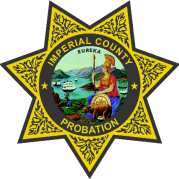Administration
About Us
The Imperial County Probation Department is a public safety agency that assists the local criminal and civil court system and is committed to reducing recidivism and promoting community safety. The Probation Department works in a collaborative manner with other law enforcement, social services agencies, mental health, schools, public and private community partnerships as well as other county departments.
The responsibilities of the Department encompass juvenile services, adult services, the operation of a juvenile hall and a Day Reporting Center. Imperial County Probation Officers supervise over 2,000 adult and juvenile offenders on Court-Ordered Probation or in Diversion Programs. The dedicated sworn-personnel perform a wide variety of assignments including conducting investigations and preparing reports on adult and juveniles facing criminal or juvenile court action, providing intensive supervision, early intervention and treatment services, and participating in high-profile task force assignments. Our non-sworn staff provide critical administrative support and ensure the public receives the highest level of customer service. For individuals considering a career in Probation and Juvenile Corrections, opportunities exist for interns and volunteers.
Mission, Vision, and Values
Mission
The Imperial County Probation Department is committed to enhancing public safety by reducing recidivism, motivating behavioral change, enforcing court orders, and advocating for victims.
Vision
The vision of the Imperial County Probation Department is to be a leader and an active community partner in promoting safety and enhancing the quality of life in Imperial County. We are committed to our mission and implementing best practices.
Values
Integrity
Rehabilitation
Ethics
Networking
Excellence
Contact and Location Information
Monday - Friday
8 A.M - 5 P.M
Metrics and Data
The Imperial County Probation Department submits data to State and Federal justice agencies on a monthly, quarterly, and annual basis. Information that is submitted can be found below:
California Department of Justice
Judicial Branch of California
Chief Probation Officers of California
Task Forces & Agency Colaborations
The Imperial County Probation Department collaborates with numerous local, state, and federal agencies to help protect and serve the community. Below are some of the task forces and agency collaborations that the Probation Department participates with on a regular basis:
Narcotics Task Force (NTF), Street Interdiction Team (SIT) & Drug Enforcement Agency (DEA)
The Probation Department collaborates with Federal, State, and Local agencies to combat the entry and use of illegal drugs within the community. The Department regularly participates with street level narcotic enforcement, paroles and probation, and violent offender monitoring. In addition, the Probation Department collaborates with a team of law enforcement agencies assigned to the Drug Enforcement Agency in order to conduct surveillance and investigate drug traffickers.
San Diego Law Enforcement Coordination Center (SD LECC)
The Imperial County Probation Department coordinates with the San Diego Law Enforcement Coordination Center (SD-LECC), which serves as the High Intensity Drug Trafficking Area (SD/I HIDTA) Investigative Support Center (ISC) for the San Diego and Imperial County region. The SD-LECC also serves as the Regional Threat Assessment Center (RTAC) for San Diego and Imperial counties and is part of the California State Threat Assessment System (STAS). The SD-LECC operates as a collaborative partnership among federal, state and local law enforcement/public safety agencies focused on enhancing coordination, information sharing, regional preparedness, training and investigative support/analysis for first responders and other public and private partners in the region.
Operation Stonegarden
The Imperial County Probation Department participates regularly with the OPSG Program. The program is designed to support enhanced cooperation and coordination among Customs and Border Protection (CBP), United States Border Patrol (USBP), and local, Tribal, territorial, state, and Federal law enforcement agencies. The OPSG Program funds investments in joint efforts to secure the United States borders along routes of ingress from international borders to include travel corridors in states bordering Mexico and Canada, as well as states and territories with international water borders.
Imperial County Gang Intelligence Coalition
The Probation Department supports the Imperial County Gang Intelligence Coalition which serves as an intelligence sharing group on current threats and/or incidents presented by and/or involving prison gangs, street gangs, Outlaw Motorcycle Gangs, and Transnational Criminal Organizations operating inside and traversing the Imperial Valley.
Plans & Initiatives
Below are plans and initiatives developed by the Imperial County Probation Department in collaboration with other agencies which outline the progress of ongoing programs and services and introduction of new ones:
Careers
Employment opportunities can be viewed on the Imperial County Human Resources website. Please review the Probation Department listings thoroughly before completing the application and submitting to the Human Resources department
Background Investigations
A background investigation will be conducted using guidelines established by the California Commission on Peace Officers Standards and Training. The following areas will be evaluated to determine if you are a viable peace officer candidate:
- Employment History
- Conduct
- Driving Record
- Criminal Record
- Narcotic Use
- Legal Issues
- Family
- Military Experience
- Financial History
- Residence History
General Frequently Asked Questions
Probation is a sanction that’s been ordered by the court system. After an adult offender is convicted of a crime, the Court can suspend the sentence and place the offender on probation to the Court or on formal probation. If summary probation is ordered, the defendant does not report to a Probation Officer. If formal probation is ordered, the Probation Department will monitor the defendant’s compliance with the Court’s orders. The Court can order the defendant to serve up to a year in county jail as a condition of probation. While on probation the offender must obey all laws and follow the specific orders issued by the Court.
A "suspended sentence" is one that's imposed but not carried out. If a probationer does not violate their terms of probation, then they will not have to serve the prison sentence. The Court often give first time offender’s suspended sentences as an incentive for keeping out of trouble. It also frees up scarce jail space for more serious offenders. At the end of the suspension period, the judge may lift the sentence if there haven't been violations of probation. If a probationer has re-offended during their suspension (probation) period, they will likely be sent to prison to serve the original sentence.
Generally, yes. If you've done everything you were required to do when you were sentenced to probation, including paying all restitution, fines and fees ordered, the deputy probation officer may be able to file a petition for an early release from probation.
Probation refers to adult offenders whom courts place on supervision in the community through a probation agency, generally in lieu of incarceration. Probationers can have a number of different supervision statuses including active supervision, which means they are required to regularly report to a probation authority in person, by mail, or by telephone. Other supervision statuses include probationers who only have financial conditions remaining, have absconded, or who have active warrants. In many instances, while on probation, offenders are required to fulfill certain conditions of their supervision (e.g., payment of fines, fees or court costs, participation in treatment programs) and adhere to specific rules of conduct while in the community. Failure to comply with any conditions can result in incarceration.
Parole refers to criminal offenders who are conditionally released from prison to serve the remaining portion of their sentence in the community. Prisoners may be released to parole either by a parole board decision (discretionary release/discretionary parole) or according to provisions of a statute (mandatory release/mandatory parole). This definition of parole is not restricted to only prisoners who are released through a parole board decision, but also includes prisoners who are released based on provisions of a statute. Parolees can have a number of different supervision statuses including active supervision. Other supervision statues include parolees who only have financial conditions remaining, have absconded, or who have active warrants. Parolees are also typically required to fulfill certain conditions and adhere to specific rules of conduct while in the community. Failure to comply with any of the conditions can result in a return to incarceration.
The Probation Department has many types of supervision programs to monitor a defendant’s conduct. For example, if he/she has a drug problem, the defendant could be referred to local or out of county live-in rehabilitation programs. Whatever the type of supervision, the defendant is expected to abide by the conditions of probation that were set out by the Court. The frequency and method of Probation Officer contact with probationers depends on the seriousness of the offenses committed. If the defendant does not comply with probation conditions, his/her probation can be revoked and he/she can be sentenced to prison to serve the prison term that was suspended or stayed earlier. In addition to special supervision programs, there are special programs (conditions of probation) offered such as Work Furlough. These programs allow consequences for the defendant other than jail custody.
Even with an Expungement, you will not be allowed to own or possess a firearm until you would otherwise be able to do so. Your dismissed conviction can still be used to increase your punishment in future criminal cases, if the offense is "priorable"- such as a DUI or theft offense. An expungement will not relieve you of your duty to register as a sex offender.
No. An expungement changes and updates the disposition of the case to reflect a dismissal under 1203.4 of the Penal Code. This means the Court file, the California Department of Justice, and the FBI update their files to show the case has been ordered dismissed by the Court.
Expungement law (Penal Code Section 1203.4) provides in part:
"[Petitioner shall]...be permitted by the court to withdraw his or her plea of guilty or plea of nolo contendere and enter a plea of not guilty; or, if he or she has been convicted after a plea of not guilty, the court shall set aside the verdict of guilty; and, in either case, the court shall thereupon dismiss the accusations or information against the defendant and except as noted below, he or she shall thereafter be released from all penalties and disabilities resulting from the offense of which he or she has been convicted, except as provided..."
- If Private Employers ask if you have ever been convicted of a crime, you can respond with "NO."
- On questions by Government Employers or Government Licensing Applications, if you are asked if you have ever been convicted of a crime, you must disclose the expunged case.
- However, you should disclose that the conviction has been expunged in the "explanation/further details" section on the application.

